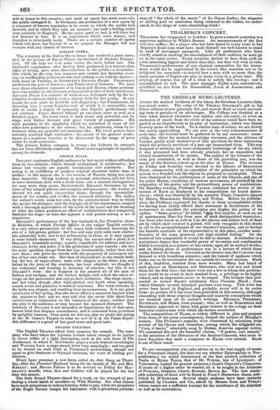THE GRESHAM MUSIC-LECTURES.
AMONG, the musical incidents of the times, the Gresham Lectures claiaa occasional notice. The value of Sir Thomas GRESHAM'S gift to his fellow-citizens is now generally felt, and crowds flock at every succeed- ing term to partake of its advantages. His College was founded at a time when musical education was neither rare nor costly, or when an exclusion of music from the circle of the sciences would have been re- garded as an imperfection in its plan of instruction, which was liberal in every sense of the word. To a similar state of society we are slowly but surely approaching. We are now at the very commencement of seed-time; the harvest must he gathered in by our successors; mean- while, the thirst for musical knowledge increases, and the citizens of London gladly avail themselves of that provision for their instruction which the princely merchant of a past age bequeathed them. This was designed to embrace, not mere elementary knowledge of the art, which it was presumed had been already attained, but an exposition and critical examination of its results. The subject of the lectures of the term just concluded, as well as those of the preceding one, was the music of the German school up to the time of MASSE. The lectures on Friday and Saturday were devoted to the labours of SEBASTIAN BACH ; commencing with an exposition of the principles on which his system was founded and the objects he proposed to accomplish. These were illustrated by the performance of some of his Chorals, and one of his entire Motets, consisting of various movements, all marked by the originality of his genius and his extraordinary power of combination. On Saturday evening, Professor 'Lanka continued his review of the system of BACH as displayed in his compositions for keyed instru- ments; which was illustrated by his masterly Triple Concerto, played by Messrs. MOSCHELES, BENEDic-r, and Thrum. Before its perform- ance, the Professor expressed his thanks to these accomplished artists for having most kindly offered their assistance in furtherance of his eudeavours to elucidate the principles and display the genius of its author. "Some persons," he added, "may feel surprise at such an act of spontaneous liberality from men of such distinguished reputation ; but those who know 85 well as I do the sincere and ardent love of their art by which their conduct is guided, will only recognize in this desire to aid in the accomplishment of our founder's intention, and to further the humble exertions of his representative in this place, another mani- festation of the same generous and high-minded feeling." On the merits of this composition it would be idle to descant. It embodies in a preeminent degree that wonderful power of invention and combination which is stamped, to a greater or less extent, upon all its author's works; and its fitting place of performance was in a lecture of which those works formed the theme. Crowded as the theatre was, the Concerto was listened to with breathless attention ; and the tumult of applause which broke out on its termination did not subside for several minutes. Much of this, doubtless, resulted from mere wonder. Many had heard of such players as MOSCHELES and Be/miner, who now saw and heard them for the first time ; but there were not a few to whom this perform- ance would be an event in their musical lives, a privilege to be highly valued, and an impression never to be erased. The lecturer then pro- ceeded to review Baca's celebrated Gros Passions Musik ; from which Oratorio several detached portions were sang. This work has never been heard in England, and probably never will in its entire form : no portion of it has even been published in this country, although abounding with those original thoughts and masterly conceptions which are stamped upon all its author's writings. MOLIQUE, PIRKHER'r, Fausaterne, and Mona, were present ; who, as well as MOSCHELES and BENEDICT, appeared to listen with great interest to the eulogy on their immortal countryman with which the lecture concluded. The compositions of MASSE, so widely different in plan and purpose from those of his great contemporary, formed the subject of Moriches lecture. The Professor's remarks were illustrated by selections from several of his Operas and Oratorios ; among which, the delightful air, "Cara, ti lascio," admirably sung by Hoarts, deserves especial notice. We commend this and the beautiful chorus, "0 godete, cari amanti," to the attention of the Directors of the Ancient Concerts, who seem to have forgotten that such a composer as MASSE ever existed. Ram is out of their reach.


























 Previous page
Previous page